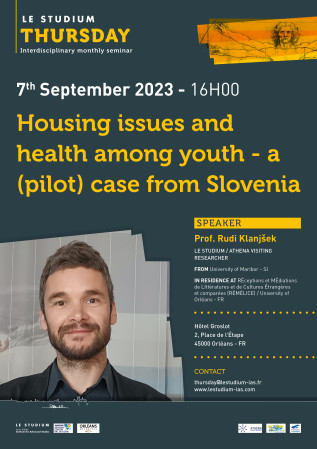Housing issues and health among youth - a (pilot) case from Slovenia
Hôtel Groslot
2, Place de l’Étape
45000 Orléans
France
Presentation
Depression, anxiety and behavioural disorders are among the leading causes of illness and disability among youth. In the U.S., CDC (Centers for Disease Control and Prevention) reported that in the 10 years leading up to the pandemic, feelings of persistent sadness and hopelessness, as well as suicidal thoughts and behaviors, increased by about 40 percent. Similarly, in autumn 2022, Renew Europe launched a Youth Mental Health Survey to find out more about why young people are increasingly experiencing mental health issues such as depression, anxiety and loneliness.
Past research lists various factors that help us understand youth health and its negative trends (e.g., changes in the labour market, climate crisis, high expectations regarding standards of success, crisis of meaning, the role of social media etc.), but the issue of housing, which WHO (World Health Organization) recognizes as a key social factor of health, is rarely mentioned. This is somewhat surprising, as one might reasonably assume that, for example, lack of affordable housing or low housing stability (e.g., rent) induces worry and stress, which are known to be related to depression. Thus, more research effort is needed in this regard, also in terms of assessing the relationships between various housing factors (e.g., residential instability, affordability, housing safety and quality) and various dimensions of youth health. Dedicating more research focus to these issues seems important not only because the consequences of failing to address youth health conditions extend to adulthood, impairing both physical and mental health and limiting opportunities to lead fulfilling lives as adults, but also because recent housing trends suggest that affordability is becoming a key hurdle in achieving “existential milestones”, including childbearing. In turn, examining and identifying relationship between housing and health might offer additional insights into why youth (mental) health is deteriorating.
Consequently, the main aim of the presentation is two-fold:
First, to discuss, using data from nationally representative sample of Slovenian youth, whether and how housing stability, quality and perception of having a housing problem are related to stress and assessment of health among youth. Additionally, since past research indicated that differences in health outcomes are often attributed to differences in socioeconomic status, the issue of youth's economic background will also be included. The results from this research will be treated as a "pilot project” that might be seen as relevant for wider EU context concerning youth health.
Second, to reflect upon the issue of why and how did this situation, where youth of today face an uphill battle when it comes to affordable housing, especially in areas where there are educational and work opportunities, came about. Structural, cultural and individual factors will be evaluated.
Speaker
LE STUDIUM / ATHENA Visiting Researcher
FROM: University of Maribor - Sl
IN RESIDENCE AT: RÉceptions et MÉdiations de LIttératures et de Cultures Étrangères et comparées (RÉMÉLICE) / University of Orléans - FR






